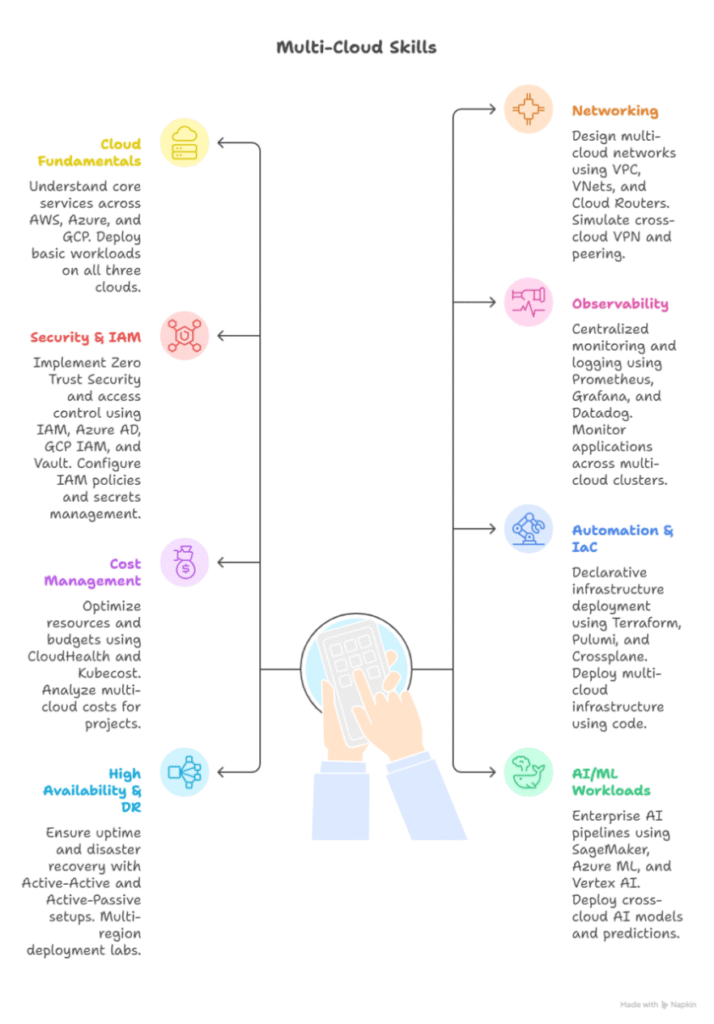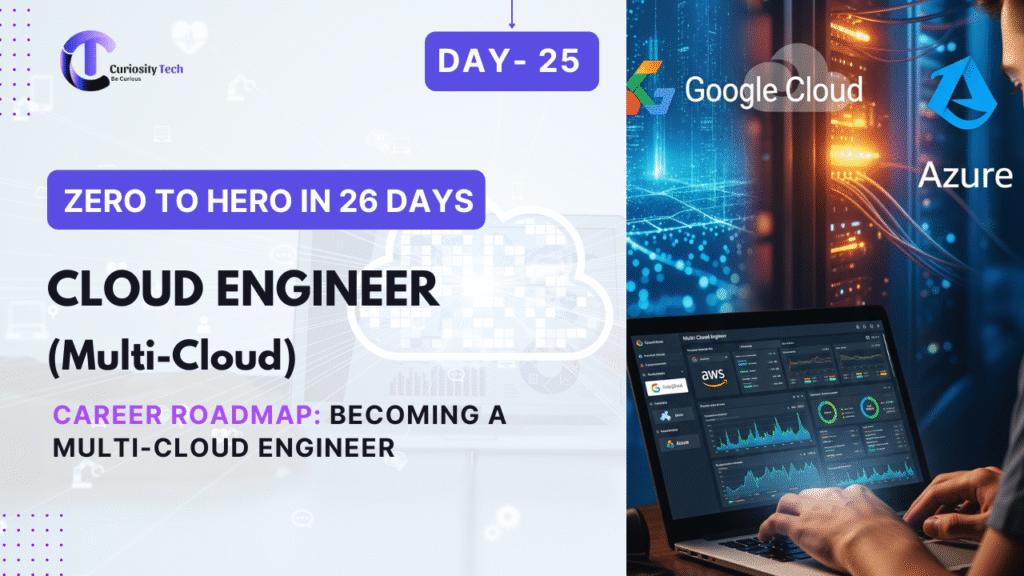Introduction
The cloud industry in 2025 demands engineers capable of designing, deploying, and managing workloads across AWS, Azure, and GCP simultaneously.
Being a multi-cloud engineer is not just about certification — it’s about hands-on skills, architecture thinking, security awareness, and operational excellence.
At CuriosityTech.in, our multi-cloud career roadmap is designed to guide learners from fundamentals to advanced enterprise-level expertise, combining theory, practical labs, and mentorship.
Section 1 – Why Multi-Cloud Expertise is Crucial
1. Enterprise Adoption: Most organizations now operate in hybrid or multi-cloud environments.
2. Flexibility & Avoiding Vendor Lock-In: Knowledge of multiple providers allows strategic cloud decisions.
3. Career Growth: Multi-cloud engineers are in high demand, commanding senior roles and better salaries.
4. Holistic Problem Solving: Understanding differences in AWS, Azure, and GCP enables optimized, resilient architectures.
Section 2 – Stepwise Career Roadmap
Step 1 – Foundational Skills
● Learn cloud basics: Compute, Storage, Networking, IAM.
● Explore provider-specific foundational courses:
○ AWS Cloud Practitioner
○ Azure Fundamentals
○ Google Cloud Digital Leader
● CuriosityTech Labs: Deploy simple apps on all three clouds to understand provider differences.
Step 2 – Hands-On Deployment Skills
● Deploy multi-tier applications using VMs, managed databases, and storage services.
● Learn Infrastructure as Code (IaC): Terraform, Pulumi, Crossplane.
● Labs: Students replicate a web app across AWS + Azure + GCP, implementing IAM, networking, and storage configurations.
Step 3 – Intermediate Specialization
● Focus on networking, security, monitoring, and cost management in multi-cloud setups.
● Tools & Skills:
○ Monitoring: Datadog, Prometheus, Grafana
○ Security: Vault, GuardDuty, Azure Security Center
○ Cost Management: CloudHealth, Kubecost
● Labs: Simulate cross-cloud failures and incident response.
Step 4 – Advanced Architecture & Automation
● Master hybrid architectures, disaster recovery, and high availability.
● Automate deployment pipelines: CI/CD with Jenkins, GitHub Actions, Azure DevOps.
● Labs: CuriosityTech simulates multi-cloud DR & auto-scaling scenarios.
Step 5 – Multi-Cloud Mastery
● Deep dive into specializations: AI/ML workloads, serverless orchestration, advanced networking.
● Achieve professional certifications: AWS Solutions Architect Professional, Azure Solutions Architect Expert, GCP Professional Cloud Architect.
● Labs: Deploy multi-cloud AI/ML pipeline, integrating SageMaker, Vertex AI, and Azure ML.
Step 6 – Leadership & Strategy
● Develop skills for Cloud Solution Architect roles.
● Learn cost optimization, compliance strategy, and vendor management.
● Mentor junior engineers and contribute to enterprise-wide cloud strategy.
● CuriosityTech mentorship: Engineers work on real enterprise projects under guidance.
Section 3 – Multi-Cloud Skills Mapping Table

Section 4 – Practical Milestones & Timeline
Year 1: Cloud fundamentals, initial deployments, foundational certifications.
Year 2: Intermediate specialization, hands-on multi-cloud projects, associate certifications.
Year 3: Advanced architecture, automation, professional certifications, cross-cloud labs.
Year 4+: Mastery in AI/ML, serverless orchestration, multi-cloud leadership roles.
CuriosityTech Labs provide accelerated learning, enabling learners to achieve 2–3 years of experience in months through intensive practice.
Section 5 – Tips for Aspiring Multi-Cloud Engineers
1. Practice First, Learn Later: Hands-on labs are more valuable than only theory.
2. Cross-Cloud Mental Model: Map services across AWS, Azure, GCP to understand equivalencies.
3. Document Everything: Architecture diagrams, lab notes, lessons learned.
4. Follow Enterprise Use Cases: Learn how banks, healthcare, and retail deploy multi-cloud workloads.
5. Continuous Learning: Multi-cloud evolves rapidly — stay updated on emerging tools.
Conclusion
Becoming a multi-cloud engineer is a progressive journey — from foundational knowledge to hands-on expertise, advanced architecture, and strategic leadership.
At CuriosityTech.in, learners gain a structured roadmap, practical labs, mentorship, and exposure to real-world projects, ensuring they are fully prepared for enterprise multi-cloud roles.
Success requires persistent practice, curiosity, and understanding cross-cloud synergies. The roadmap transforms learners into engineers who can architect, operate, and optimize workloads across AWS, Azure, and GCP seamlessly.



